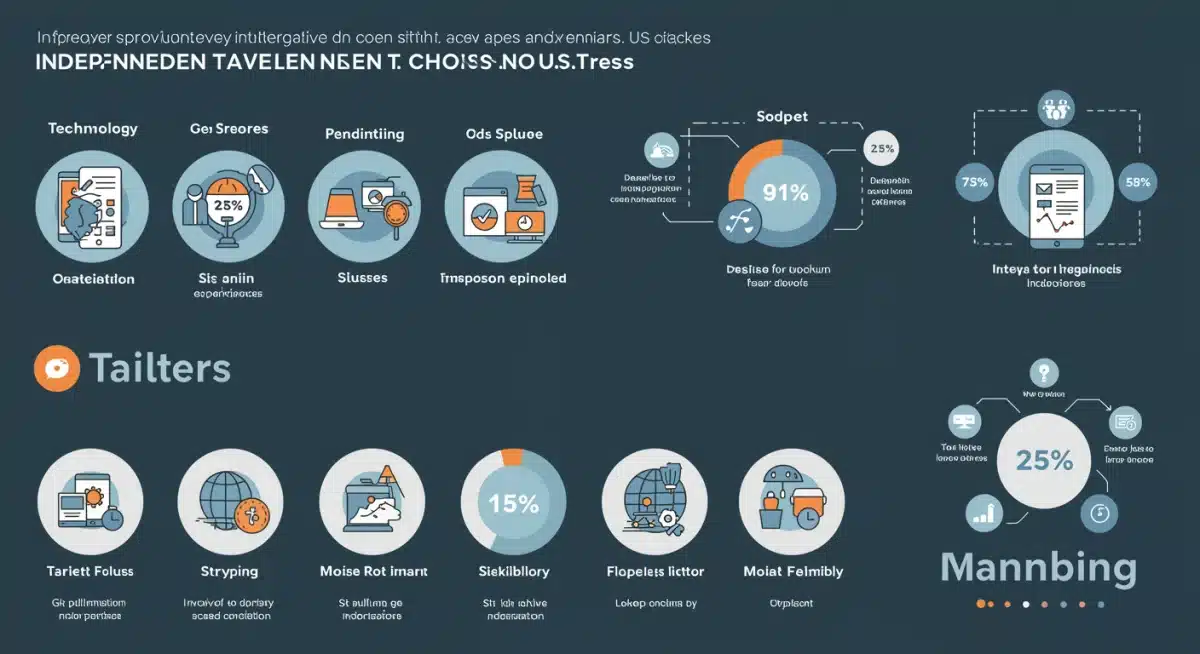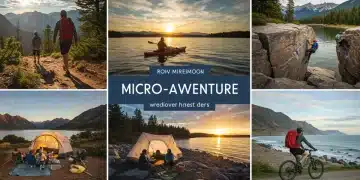US Traveler Evolution: 25% Shift to Independent Journeys by 2025

Data insights indicate a significant 25% shift of US travelers towards independent and self-planned journeys by 2025, reflecting a growing preference for personalized, flexible, and authentic travel experiences.
The landscape of travel is in constant flux, but recent data points to a particularly compelling transformation: the evolving US traveler, with a projected 25% shift towards independent and self-planned journeys by 2025. This isn’t just a minor adjustment; it’s a significant realignment in how Americans approach their adventures, driven by a confluence of technological advancements, changing priorities, and a deeper desire for authentic engagement with the world.
Understanding the Independent Traveler Mindset
The independent traveler represents a growing segment within the US tourism market, characterized by a preference for self-directed itineraries over pre-packaged tours. This mindset prioritizes flexibility, personalization, and a sense of discovery that often feels diluted in more structured travel arrangements.
This shift isn’t merely about avoiding travel agents; it’s about reclaiming agency over the travel experience. Travelers are increasingly taking the reins, from researching destinations and booking accommodations to crafting daily activities and managing logistics. The appeal lies in the freedom to adapt plans on the fly, delve deeper into personal interests, and connect with destinations on a more intimate level.
Key Motivations for Self-Planned Journeys
- Personalization: The ability to tailor every aspect of a trip to individual preferences, interests, and pace.
- Flexibility: Freedom to change plans, explore unexpected detours, and extend stays without rigid schedules.
- Cost Control: Opportunity to research and choose more budget-friendly options, often leading to significant savings.
- Authenticity: A desire to experience local culture and interact with communities outside of typical tourist bubbles.
Ultimately, the independent traveler seeks an unscripted journey, one where the narrative unfolds organically, shaped by their own choices and serendipitous encounters. This desire for autonomy is fundamentally reshaping how travel products and services are consumed.
The Digital Revolution: Empowering Self-Planners
The rise of the independent traveler is inextricably linked to the pervasive influence of digital technology. The internet has democratized travel planning, putting a wealth of information and booking tools directly into the hands of consumers. This accessibility has fueled the confidence and capability of individuals to orchestrate complex trips without external assistance.
From comprehensive review sites to sophisticated booking platforms, travelers now have access to an unprecedented array of resources. Mobile applications provide real-time information, navigation, and communication tools, making on-the-go adjustments and discoveries seamless. This technological ecosystem empowers travelers to be their own travel agents, armed with data and insights that were once the exclusive domain of industry professionals.
Tools and Platforms Driving Independent Travel
- Accommodation Apps: Airbnb, Booking.com, Vrbo offer diverse lodging options from hotels to unique local stays.
- Flight Aggregators: Google Flights, Skyscanner, Kayak simplify comparing prices and finding optimal routes.
- Review Platforms: TripAdvisor, Yelp, Google Reviews provide peer insights on everything from restaurants to attractions.
- Navigation & Translation Apps: Google Maps, Citymapper, iTranslate facilitate seamless exploration in unfamiliar territories.
The continuous innovation in travel technology ensures that self-planned journeys become not only possible but increasingly efficient and enjoyable. This digital empowerment is a cornerstone of the 25% shift we are observing.
Economic Factors and Value-Driven Choices
Beyond the allure of personalization and digital convenience, economic considerations play a significant role in the growing preference for independent travel. Travelers are becoming savvier consumers, actively seeking ways to maximize value and control their expenditures. Self-planning often presents opportunities for more cost-effective travel compared to traditional packaged tours.
The ability to compare prices across various providers for flights, accommodations, and activities allows independent travelers to construct trips that align precisely with their budgets. This meticulous approach to spending doesn’t necessarily mean opting for the cheapest options, but rather making informed decisions that deliver the best value for their money. This focus on value is particularly resonant in an economic climate where discretionary spending is carefully considered.
Budgeting and Savings Strategies
- Dynamic Pricing Awareness: Monitoring flight and hotel prices to book during off-peak times or when deals emerge.
- Alternative Accommodations: Utilizing hostels, guesthouses, or apartment rentals which can be more affordable than hotels.
- Local Transportation: Opting for public transport, walking, or biking instead of taxis or private transfers.
- Self-Catering Options: Choosing accommodations with kitchenettes to reduce dining out expenses.
The financial autonomy offered by independent travel is a powerful motivator, allowing more Americans to fulfill their travel aspirations without breaking the bank. This economic empowerment contributes significantly to the observed shift towards self-planned journeys.
The Quest for Authenticity and Local Immersion
A driving force behind the evolving US traveler‘s preference for independent journeys is a profound desire for authenticity. Modern travelers are increasingly seeking experiences that transcend typical tourist traps, aiming instead for genuine engagement with local cultures, communities, and environments. This quest for immersion is difficult to achieve within the confines of rigid, pre-planned itineraries.
Independent travel allows for spontaneous interactions, discovery of hidden gems, and the chance to live like a local, even for a short period. This could mean dining at a non-touristy restaurant, attending a local festival, or simply navigating a city using public transportation. These experiences foster a deeper connection to the destination and create more memorable, meaningful travel narratives.

Experiential Travel Preferences
- Culinary Exploration: Seeking out local eateries, food markets, and cooking classes.
- Cultural Exchange: Engaging with local residents, participating in community events, and visiting lesser-known historical sites.
- Adventure and Nature: Embarking on self-guided hikes, exploring national parks, or participating in outdoor activities.
- Slow Travel: Spending more time in fewer locations to gain a deeper understanding and appreciation.
The pursuit of authentic experiences resonates deeply with travelers who view their journeys not just as vacations, but as opportunities for personal growth and cultural enrichment. This nuanced perspective is a key indicator of the changing demands within the travel sector.
Challenges and Considerations for Independent Travelers
While independent travel offers significant advantages, it also comes with its own set of challenges. The responsibility of planning and executing every aspect of a trip falls squarely on the traveler, which can be time-consuming and, at times, stressful. From navigating unfamiliar transportation systems to dealing with unexpected issues, self-planned journeys require a higher degree of preparedness and problem-solving skills.
Language barriers, cultural differences, and potential safety concerns are also factors that independent travelers must consider and prepare for. While technology can mitigate some of these issues, a certain level of resilience and adaptability is essential. However, for many, these challenges are viewed as part of the adventure, contributing to the richness and reward of the experience.
Common Hurdles and Solutions
- Extensive Research: Requires significant time to compare options and plan logistics, mitigated by using comprehensive online guides.
- Unexpected Issues: Dealing with flight delays, lost luggage, or booking errors, often managed through travel insurance and contingency plans.
- Language Barriers: Overcome with translation apps, phrasebooks, and a willingness to learn basic local phrases.
- Safety Concerns: Addressed by researching safe neighborhoods, understanding local customs, and sharing itineraries with trusted contacts.
Despite these potential difficulties, the allure of crafting a truly unique and personal travel experience continues to drive the momentum towards independent exploration. The proactive approach to planning fosters a sense of accomplishment and deeper engagement with the journey.
Implications for the Travel Industry
The pronounced shift towards independent and self-planned journeys among US travelers has significant implications for the broader travel industry. Traditional tour operators and travel agencies face the imperative to adapt their offerings to cater to this evolving demand. Simply offering pre-packaged tours may no longer suffice; personalization and flexibility are becoming paramount.
This trend encourages travel providers to pivot towards offering modular services, curated experiences, and specialized advice that empowers travelers rather than dictates their itineraries. Technology platforms that facilitate seamless self-planning, from AI-driven recommendation engines to integrated booking systems, are likely to see continued growth. The industry must recognize that the modern traveler seeks partnership in their planning, not just a transaction.
Adapting to the New Travel Landscape
- Curated Experiences: Offering unique activities and local insights that travelers can integrate into their self-planned trips.
- Flexible Booking Options: Providing adaptable cancellation policies and customizable packages.
- Enhanced Digital Tools: Developing user-friendly apps and websites that streamline research and booking processes.
- Expert Consultation: Shifting from full-service planning to offering specialized advice and concierge services for independent travelers.
Ultimately, the travel industry that thrives in this new environment will be one that embraces the independent spirit of the evolving US traveler, offering tools, insights, and support that enhance, rather than restrict, the freedom of self-planned adventures.
| Key Trend | Brief Description |
|---|---|
| 25% Shift to Independent Travel | A quarter of US travelers are projected to opt for self-planned journeys by 2025, moving away from organized tours. |
| Digital Empowerment | Technology and online resources are crucial for research, booking, and on-the-go management of independent trips. |
| Authenticity & Personalization | Travelers seek unique, immersive cultural experiences tailored to individual preferences, driving the self-planning trend. |
| Industry Adaptation | Travel companies must offer flexible, modular services and enhanced digital tools to cater to self-directed travelers. |
Frequently Asked Questions About Independent US Travel
An independent traveler is a US individual who prefers to plan and book their trips themselves, without relying on traditional tour operators. They prioritize personalization, flexibility, and often seek authentic local experiences, using digital tools extensively for research and logistics.
This shift is driven by several factors, including the widespread availability of online planning tools, a desire for greater personalization and authenticity, better cost control, and increased confidence in managing travel logistics independently. Economic factors also play a role.
Technology is crucial, providing platforms for booking flights and accommodations, offering real-time navigation, translation services, and access to peer reviews. Smartphones and various apps empower travelers to manage their entire journey from research to execution efficiently and seamlessly.
Challenges include the time required for extensive planning, potential language barriers, navigating unfamiliar environments, and handling unexpected issues like delays or cancellations. However, many see these as part of the adventure and develop contingency plans.
The industry needs to offer more flexible, modular services, focus on curated experiences, and enhance digital tools that empower self-planners. Traditional providers should consider shifting towards advisory roles or offering components that independent travelers can integrate into their trips.
Conclusion
The data clearly indicates that the evolving US traveler is increasingly embracing independent and self-planned journeys, with a substantial 25% shift projected by 2025. This transformation is not a fleeting trend but a fundamental recalibration of travel preferences, driven by a powerful combination of technological empowerment, economic savvy, and a profound desire for authentic, personalized experiences. For travelers, it represents a new era of freedom and discovery, while for the travel industry, it signals an urgent call to innovate, adapt, and cater to a more autonomous and discerning clientele. Understanding and responding to this shift will be paramount for success in the coming years.





